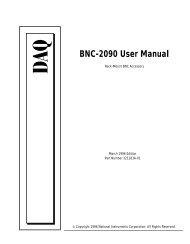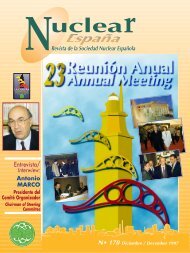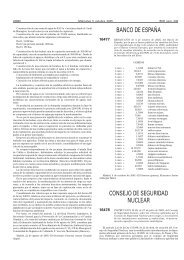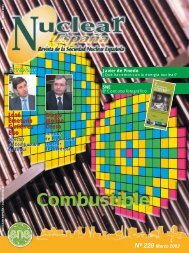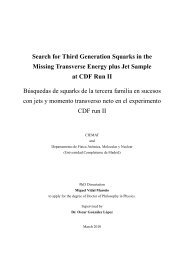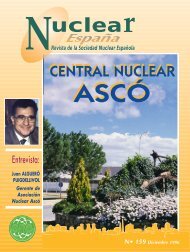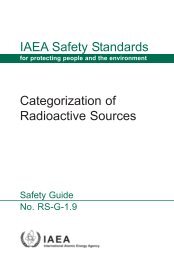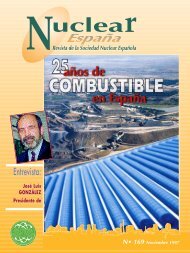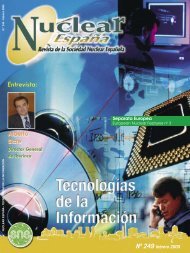EntrEntr evista/evista/ InterInter viewview
EntrEntr evista/evista/ InterInter viewview
EntrEntr evista/evista/ InterInter viewview
You also want an ePaper? Increase the reach of your titles
YUMPU automatically turns print PDFs into web optimized ePapers that Google loves.
CENTRALES NUCLEARES/NUCLEAR POWER PLANTS<br />
dores nucleares, digamos hasta<br />
unos 10, ya que tendrán más recursos<br />
técnicos y mayor solidez<br />
financiera que los explotadores<br />
de una sola unidad.<br />
La desregulación ha obligado<br />
a los explotadores nucleares a<br />
replantearse la continuación de<br />
la propiedad de sus centrales.<br />
Ahora voy a hablar de<br />
AmerGen. Esta empresa es un<br />
‘joint venture’ a partes iguales<br />
(50/50) entre British Energy y<br />
PECO Energy de Philadelphia.<br />
El joint venture se constituyó en<br />
el año 1997 con la única intención<br />
de adquirir centrales nucleares<br />
en los EE.UU. Cabe destacar<br />
que el propio PECO se<br />
encuentra actualmente en plena<br />
fusión con una compañía con la<br />
que muchos de Vds. están familiarizados<br />
– Commonwealth<br />
Edison, una filial participada al<br />
100% de Unicom.<br />
Por tanto, si miramos al conjunto<br />
de este grupo – BE con 15 reactores,<br />
PECO con 4, AmerGen actualmente<br />
aproximándose a 6, y Unicom con<br />
10 – nuestro Joint Venture será el<br />
agrupamiento nuclear en propiedad<br />
de los inversores más grande del<br />
mundo. ¡Un total de 35 reactores y<br />
en crecimiento!<br />
Esto nos da una gran solidez y los<br />
recursos técnicos y empresariales<br />
para aplicar a nuestros activos, que<br />
es crucial en el mundo competitivo.<br />
De nuestros seis acuerdos anunciados,<br />
dos de ellos (Clinton y TMI)<br />
ya son de la plena propiedad de<br />
AmerGen, y otros cuatro se encuentran<br />
en distintas etapas de la tramitación<br />
y aprobación reguladora.<br />
En total son unos 4.000 MW con<br />
otros 5.000 MW de centrales en desarrollo<br />
activo. Nuestra participación<br />
del 50% en AmerGen ya está<br />
aportando a British Energy unos beneficios<br />
significativos antes de impuestos.<br />
Hay varios aspectos que son cruciales<br />
para el éxito del acuerdo de<br />
una central nuclear:<br />
SECTOR NUCLEAR EN EE.UU. / US NUCLEAR<br />
• 100 Unidades / Units<br />
• 80 Propietarios / Owners<br />
• Objetivos de la NRC / NRC view<br />
- 10 propietarios dentro de 5 años / 10 owners within 5 years<br />
- Compañías más fuertes / stronger companies<br />
- Mayores reservas de talento / larger pool of talent<br />
· Consolidación / Consolidation<br />
• En primer lugar, “tal cual” no<br />
resulta económico. Típicamente, cada<br />
central tendrá un valor contable<br />
de entre uno a dos mil millones.<br />
Pero este hecho es totalmente irrelevante.<br />
El verdadero valor es el valor<br />
descontado de lo que puede ganar –<br />
un cálculo sencillo basado en producción<br />
y los futuros precios eléctricos<br />
menos los costes de operación y<br />
financiación.<br />
• En segundo lugar, los fondos de<br />
clausura los tiene que aportar totalmente<br />
el vendedor. Una vez cumplido<br />
esto, AmerGen es el último<br />
responsable de la clausura de la<br />
central dentro de presupuesto.<br />
• La eliminación del combustible<br />
gastado sigue siendo responsabilidad<br />
del gobierno federal de los<br />
EE.UU., con un pago por AmerGen<br />
al gobierno de $1 por MWh en concepto<br />
de este servicio.<br />
• Por último, se produce un nuevo<br />
plan de negocio para la central.<br />
Todo lo anterior requiere un proceso<br />
de relicenciamiento, trámites<br />
reguladores y una gran cantidad de<br />
actividades legales y comerciales.<br />
¿Cuáles son algunos de los ingredientes<br />
claves de este nuevo plan de<br />
negocio? Entra aquí la experiencia y<br />
conocimientos acumulados de<br />
British Energy y PECO.<br />
Por ejemplo, hará falta un nuevo<br />
convenio con la plantilla, para obtener<br />
no solo mayor flexibilidad en la<br />
forma de trabajar dentro de una<br />
central, sino también la flexibilidad<br />
necesaria para trasladar equipos expertos<br />
entre las centrales.<br />
A continuación, se realizan los<br />
procesos de planificación de las mejores<br />
prácticas: Congelar el contenido<br />
de una parada un año antes de<br />
iniciar la misma. Tener todo pedido<br />
por adelantado con tiempo suficiente<br />
para que todos los componentes<br />
y equipos estén en el emplazamiento<br />
tres meses antes de que sean necesarios.<br />
Invertir en equipos e instalaciones<br />
para minimizar el tiempo<br />
improductivo. Incluso algo tan sencillo<br />
como situar una cafetería cerca<br />
What does all this mean for the US nuclear<br />
industry?<br />
There are around 100 nuclear units in the US<br />
representing nearly 30 % of US electricity supply.<br />
Until recently the industry was highly fragmented,<br />
with over 80 owners involved in nuclear, too many<br />
for a competitive market where costs can no longer<br />
be passed through tpo consumers and where scale is<br />
vital to efficiency.<br />
The NRC, the US nuclear regulatory body,<br />
supports consolidation. Over the next five years they<br />
want to see fewer, say around 10, larger nuclear<br />
operators on the basis that they will have more<br />
technical resources and greater financial strength<br />
than single unit operators.<br />
Deregulation has forced nuclear owners to rethink<br />
their continued ownership of plants.<br />
Let me now tell you about AmerGen. This is the<br />
50/50 joint venture between British Energy and<br />
PECO Energy of Philadelphia. The joint venture was<br />
formed in 1997 with the sole intent to acquire<br />
nuclear power stations in the US. Interestingly,<br />
PECO itself is currently in the middle of a merger<br />
with a company many of you will be familiar with<br />
Commonwealth Edison which is a wholly-owned<br />
subsidiary of Unicom.<br />
So if we look at this whole group, BE with 15<br />
reactors, PECO with 4, AmerGen currently close to<br />
6 and Unicom with 10, our Joint Venture grouping<br />
will be the largest investor-owned nuclear grouping<br />
in the world. A total of 35 reactors and growing!<br />
This gives us strength in depth the technical and<br />
managerial resource to apply to our assets, vital in<br />
the competitive world.<br />
And so to our announced deals to date six of<br />
them, two of which Clinton and TMI, are now in full<br />
ownership by AmerGen and four more in varying<br />
stages of regulatory approval.<br />
In total around 4.000 MW with another 5.000<br />
MW of plants under active development. Our 50 %<br />
share of AmerGen is already contributing a<br />
significant pretax profit for British Energy.<br />
Various issues are crucial to a successful nuclear<br />
plant deal:<br />
• First of all, “as is” is uneconomic. Typically each<br />
plant will have a book value of one to two billion.<br />
But that it totally irrelevant. The true value is the<br />
A b r i l 2 0 0 0<br />
R e v i s t a S N E




